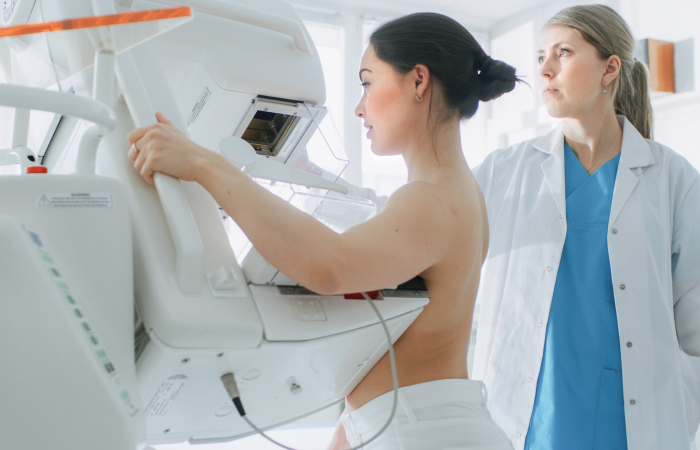
Breast Cancer Care at HSHS St. Vincent Hospital Cancer Centers
At HSHS St. Vincent Hospital Cancer Centers, we are committed to helping you understand your risk for breast cancer, recognize symptoms early, and get the care you need without delay. Our team of cancer care specialists works closely with our Prevea Health partners to guide and support you from diagnosis through treatment and beyond.
Understanding Risk Factors
Having one or more risk factors does not mean you will get breast cancer. And not having any risk factors does not mean you are safe from the disease. Risk factors simply help identify who might be more likely to develop it.
Some known risk factors include:
- Age at childbirth – Women who have no children or have their first child after age 30 have a slightly higher risk.
- Aging – Risk increases as you get older, but about 1 in 8 breast cancers happen in women under age 45.
- Alcohol – The more you drink, the higher your risk.
- Benign breast disease – Some non-cancerous breast conditions can raise your risk. Talk to your doctor about your personal risk.
- Dense breast tissue – Makes it harder to see cancer on a mammogram and increases risk.
- Gender – Women are much more likely than men to develop breast cancer, but men can get it too.
- Genetics – About 5% to 10% of breast cancers are hereditary, caused by gene changes passed down from family.
- Hormone therapy after menopause – Taking estrogen and progesterone together increases risk.
- Menstrual history – Starting periods before age 12 slightly raises risk.
- Overweight or obesity – Especially after menopause, this increases risk.
- Personal history – Having breast cancer in one breast raises your risk of getting it in the other breast or another area.
- Race/ethnicity – White women are slightly more likely to get breast cancer, but African American women are more likely to die from it due to more aggressive cancers.
More About Breast Cancer
- Mammograms.
- Breast exams by a healthcare provider.
- Self-awareness of any changes in your breasts.
- Imaging tests like mammograms, ultrasounds, or MRIs.
- A biopsy to test a sample of breast tissue.
- A new lump in the breast or underarm.
- Thickening or swelling of part of the breast.
- Changes in the size or shape of the breast.
- Nipple discharge other than breast milk.
- Redness or flaky skin on the breast or nipple.
- Pain in any area of the breast.
Being part of a trial means:
- You may receive access to advanced treatments not yet widely available.
- You are closely monitored by a team of research experts and your cancer care team.
- Your participation helps improve breast cancer care for future generations.
Your treatment plan will be made just for you. It may include:
- Surgery – to remove the cancer and sometimes nearby lymph nodes.
- Radiation therapy – to destroy any remaining cancer cells.
- Chemotherapy – medicines to kill cancer cells or shrink tumors.
- Hormone therapy – for cancers that are sensitive to hormones.
- Targeted therapy – drugs that attack specific cancer cell changes.
- Immunotherapy – helps your immune system fight cancer.
- Clinical trials – access to promising new treatments before they are widely available.
We’re Here for You
From prevention and screening to treatment and follow-up care, our team will be with you at every step.
Contact your primary care provider to learn more about breast cancer risk, screening, and treatment at HSHS St. Vincent Hospital Cancer Centers.